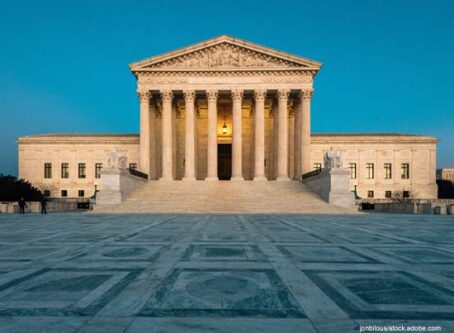As part of New Prime case, Supreme Court dissects wording of Federal Arbitration Act exemption statute
Supreme Court justices scrutinized the definition of such terms as “worker” and “employee” in New Prime’s case that will decide whether or not the Federal Arbitration Act applies to transportation workers.
The high court listened to oral arguments of the case on Wednesday, Oct. 3. At issue is whether labor disputes brought by owner-operators leased to a motor carrier are exempt from arbitration. The U.S. Court of Appeals for the First Circuit ruled that the exemption does apply to independent contractors.
New Prime then petitioned the ruling to the Supreme Court, arguing that the First Circuit’s decision would deprive both companies and workers in the transportation industry of the benefits of the Federal Arbitration Act. In February, the Supreme Court granted the petition to hear the case between the Springfield, Mo.-based trucking company and truck driver Dominic Oliveira.
Oliveira’s attorneys contended that the Federal Arbitration Act prohibits courts from applying the statute to the “contracts of employment of seamen, railroad employers or any other class of workers engaged in foreign or interstate commerce.”
During oral arguments, Prime’s attorney, Theodore Boutrous Jr., said the First Circuit’s interpretation of the exemption was “contrary to the plain meaning of the statute and its structure, purpose, history and context.”
“This Court, for many years going back to before when the Federal Arbitration Act was enacted, has said over and over again that if Congress uses words like ‘employment’ or ‘employee’ or ‘employer’ in a statute without further helpful definition, it intends for the common law agency rules to govern that employer and employee relationship.”
Justice Sonia Sotomayor interjected that the word “workers” was used instead of “employees.”
“Congress didn’t use the word ‘employees’ if it meant employees,” Sotomayor said. “It used a much broader term, ‘workers.’”
Boutrous argued that the intention of Congress was clear.
“I think it’s also important that it’s been nearly 100 years, and no court had ever decided that the words ‘contracts of employment,’ which are pretty clear, mean something completely different,” he said. “The First Circuit and Mr. Oliveira contend that those words mean agreement to work. But if Congress, Justice Sotomayor, had wanted to say ‘agreement to work,’ it could have said that. It said ‘contracts of employment.’”
In 2013, Oliveira entered into New Prime’s truck driver apprenticeship program, where drivers must attend a four-day orientation, and log 10,000 unpaid miles as a driver or passenger. After completing the supervised driving period, court documents said the student driver must take the examination for a commercial driver’s license and then drive 30,000 more miles as a B2 company driver trainee. B2 trainees were paid 14 cents per mile. After finishing the program, Oliveira became an independent contractor.
According to Oliveira’s response brief to the Supreme Court, Success Leasing, which is a separate company from New Prime but located in the same building, leased Oliveira a truck and then directed him to New Prime’s company store to purchase fuel and equipment for about $5,000.
Oliveira said Success presented him his employment paperwork labeled as Prime Independent Contractor Operating Agreement.
“Oliveira was not permitted to negotiate this agreement, and he ‘felt pressure’ to sign it quickly because Prime told him it already had a load waiting for him,” the response brief said.
According to Oliveira, New Prime paid him less than minimum wage and that deductions for fuel and lease payments on the truck occasionally left him owing money at the end of a pay period.
“That is, Prime sometimes charged Oliveira hundreds of dollars to work for the company,” the response brief stated.
In 2015, Oliveira filed a class action against New Prime, alleging that the trucking company violated the Fair Labor Standards Act, as well as the Missouri minimum-wage statute. New Prime moved to compel arbitration under the Federal Arbitration Act.
During oral arguments, Justice Ruth Bader Ginsburg questioned Boutrous whether Oliveira was an independent contractor or an employee.
“What about the argument that the independent contractor status here was a sham? That it was a label rigged to make this person appear on the face, as you said, an independent contractor when, in fact, New Prime calls all the shots?”
Boutrous responded that the question would be arbitrated.
“And if Mr. Oliveira is correct, he’d be entitled to further relief under the Fair Labor Standards Act, which is one of the provisions he’s suing under,” he said. “We disagree with that.
“It’s undisputed that Mr. Oliveira had the choice, the free – at his choice could – to be either an independent contractor or an employee.”
Jennifer Bennett, who is the attorney for Oliveira, said you have to consider the meaning of the words at the time they were written.
“It’s black-letter law that statutes are interpreted according to their ordinary, common meeting, not now but at the time they were passed,” Bennett said. “And there’s overwhelming evidence that in 1925, when the Federal Arbitration Act was passed, the words ‘contract of employment’ were a general category for agreements to perform work. They included the agreements of common law servants, as well as independent contractors.”
The complete transcript of the oral arguments can be found here.









